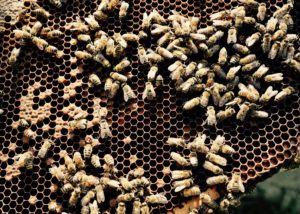
August 21 is National Honey Bee Day, a day to celebrate the insect that does so much for us and our environment, and needs our help to keep doing its important work. Local beekeeper Virginia Webb spoke with Now Habersham about the best ways to “bee kind” and appreciate our pollinators on their special day.
With more than 4,000 bee species in the United States alone, we might overlook the importance of the honey bee. These little creatures might be small, but their impact is mighty. Not only do these hard-working creatures make the honey and beeswax we use on a daily basis, but they also pollinate 80 percent of all flowering plants. From the flowers we love to see and the fruits and vegetables we love to eat, honey bees care for us every day.
On National Honey Bee Day, it’s time to reflect on how much these creatures impact us, as well as what we can do to ensure them a safe environment to do what they do best.

Bee-ing kind
There are a few things you can do today to build a safer and kinder environment for honey bees. If you’re a lover of gardening, filling your garden with bright flowers, fragrant spices and flowering shrubs can create a haven for bees to pollinate.
Farmer’s Almanac list of plants for bees
Gardeners should be aware and practice caution when using pesticides in their gardens. One of the biggest threats to the bee populations across the US are pesticides, which can be toxic to bees. Webb recommends spraying pesticides in the early evening when the honey bees have gone back to their hives for the day.
“Not every bug is a bad bug,” Webb says. “Most bad bugs come out at night or in the evening, so if you do have to spray, and I understand people have to spray their fruit and vegetables to keep the bad bugs away, it’s best if you spray them very late in the afternoon, mainly because [that’s when] those bugs are going to be […] munching down on your tomatoes or green beans or whatever it may be.”
For those who live in apartments, townhomes, condos, or for those who don’t have the means to garden, Webb recommends sprucing up a gathering location like a house of worship.
“They can be an oasis for flowering plants, honey bees, butterflies, all beneficial insects,” Webb says. “Encourage your house of worship to plant seasonal flowers that are pollinating or that will attract beneficial pollinators. Not only will it make your house of worship more beautiful, but it can also help other beneficial insects in the area.”

Supporting local beekeepers is another great way to support the work that goes into giving bees safe places to thrive. The Georgia Beekeeping Association and Georgia Locally Grown both have online directories to find honey and bee products for sale near you. Honey is also sold at most local farmers markets.
“Buy local honey. I’m not the only beekeeper up here, there are many really good beekeepers up here,” Webb says. “The best way you can know if it’s real honey that you’re eating is to get to know your local beekeeper.”
Regardless of how you support the local bee population, it’s important to understand the importance of local pollinators and make an effort to “bee kind.” Gardening, cleaning up trash and donating to bee conservation groups are great ways to help.
“Honey bees are truly the angels of agriculture,” Webb says. “They sound the alarm when there was something wrong, they are in tune to what’s going on with our earth. […] You should be kind to the honey bees.”







